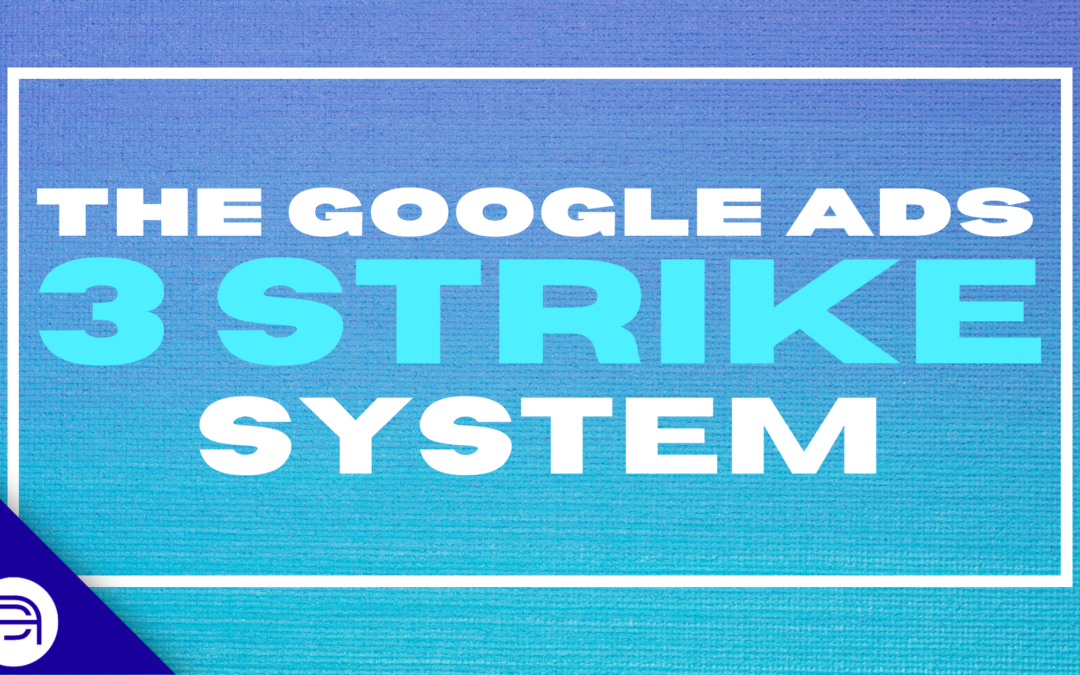The dust is starting to settle after Google’s announcement of its new “Three Strikes” system for ads that violate certain policies, but brands and advertisers still have concerns.
One day, you see an email from Google Ads saying you violated one of the rules within the new ‘strikes’ system. What happens?
Let’s start with the actual ‘strike’ system and how this program will work if you find your ads violate one of these rules.
1st Warning
The first thing that happens isn’t a true ‘strike.’ Google will notify you that you’ve violated their policy and that the ad in question has been removed from your account and will no longer serve. This warning will live in your account for 90 days. If you listen to Google’s guidelines and edit your ad appropriately, the warning will disappear after 90 Days.
But let’s say you don’t follow the guidelines. You look at the ad that was removed and think that you know better and re-create the ad that violated Google’s policy and set it live.
Strike One
Now you have a real ‘strike.’ This is when Google gets serious. If you violate the same policy again within the 90-day period, Google places your Google Ads account on a three-day hold. None of your ads will run for the next 72 hours. Google removes the violating ad and a new 90-day timer starts. After three days, the account will restart and the ‘strike’ disappears from the account after 90 days.
Again, you decide that your ad is perfectly fine and load it back into the system.
Strike Two – The Final Warning
Your account will be put on hold for a seven-day period. A new 90 day timer starts. Your ad is removed. Your account will restart after seven days and the ‘strike’ will disappear after 90 days if you follow the guidelines.
Strike Two is the final warning; Strike Three is where Google draws the line.
Still, an ill-advised advertiser thinks they know better.
Strike Three
Now you did it. Your account is suspended indefinitely. If this happens, there is little you can do to reactivate your account. If you try to make a new account, Google will detect that it is the same advertiser and suspend the new account.
The system is simple. Violate the policies enough and you lose the ability to utilize Google Ads. So why are advertisers concerned?
The Policies
Google made it clear which policies are front-and-center for its pilot program for this system:
- Enabling dishonest behavior policy
- Unapproved pharmaceuticals or supplements
- Dangerous products or services
It’s clear to see why these were included in this initial pilot program.
Despite the reasonable inclusion of these policies, many advertisers are worried about how this new system might affect their Google Ads accounts. Again, we ask: Why?
Application & Automation
Advertisers on Google Ads are used to the automated policy system zealously disapproving ads for irrelevant reasons. Images of women are frequently flagged for ‘sexual content.’ Any local advertisers in Corona, California, or Corona, Queens became accustomed to dealing with the ‘sensitive events’ policy.
Directly related to the initial policies: video game ads are frequently disapproved for “Dangerous products or services” for any images that suggest combat or weapons.
Advertisers are concerned with the policy system’s subjective and seemingly random application of policy. Further, while Google’s pilot program contains only these three policies, there will inevitably be more policies added to the “Three Strikes” system in the future.
What You Should Do Now:
- Be on the lookout for any policy violations on your Google Ads account. Don’t allow your account to show a warning without you knowing about it.
- Get used to the appeal process. Appeal policy violations on the platform or by directly contacting Google support for a manual review. If your appeal succeeds, warnings and strikes will be removed from your account.
- Ensure the stakeholders on your account are aware of any possible policy violations. The worst thing that can happen is that your account is put on hold while other team members are unaware.
- Lastly, know if your industry has requirements in order to run on Google Ads. Several industries including finance, law, and pharmaceuticals require documentation to prove that your business is legally compliant with these industry standards.
If you have any questions, feel free to reach out to [email protected] to get in contact with our team of Google experts.
-Timothy Bachman, Senior Analyst



